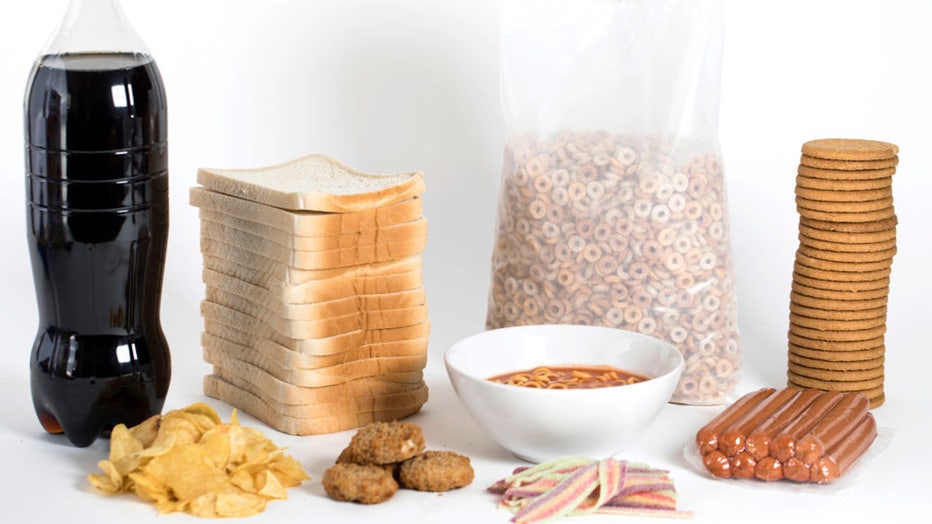High-fructose corn syrup could speed up tumor growth, study suggests

Ultra-processed foods linked to early death
?Processed meats, sugar sweetened beverages, dairy products, and French fries were the main foods contributing to the total of ultra-processed food consumed,? an author in one of the studies stated.
LOS ANGELES - A recent study has found further evidence that consuming high quantities of high-fructose corn syrup could potentially speed up the growth of some tumors in certain types of cancer.
Researchers from Washington University in St. Louis (WashU) found that in some cases, the growth rate of tumors in their animal subjects accelerated two-fold or higher when feeding them a diet that was high in fructose.
"When we think about tumors, we tend to focus on what dietary components they consume directly. You put something in your body, and then you imagine that the tumor takes it up," said Gary Patti, the Michael and Tana Powell Professor of Chemistry in Arts & Sciences and a professor of genetics and of medicine at the School of Medicine, at WashU. "But humans are complex. What you put in your body can be consumed by healthy tissue and then converted into something else that tumors use."
Liver converts fructose into fuel for cancer cells
High-fructose corn syrup alone is not what helps cancer cells grow, according to researchers. What was observed in this experiment was that the liver converted the fructose into a type of nutrient that the cancer cell could use to continue to grow.
"Our initial expectation was that tumor cells metabolize fructose just like glucose, directly utilizing its atoms to build new cellular components such as DNA. We were surprised that fructose was barely metabolized in the tumor types we tested," said the study’s first author, Ronald Fowle-Grider, a postdoctoral fellow in Patti’s lab. "We quickly learned that the tumor cells alone don’t tell the whole story. Equally important is the liver, which transforms fructose into nutrients that the tumors can use."
Each time a cancer cell divides, it needs lipids to replicate many contents, researchers explained. While these lipids are able to be created "from scratch," cancer cells can just as easily take lipids that are already present in the body.
And if the body is consuming high amounts of fructose, allowing the liver to convert that into more lipids, cancer cells can thrive more easily.
The accelerated tumor growth was evidenced for certain types of cancer in the animal subjects that were a part of this study. These included melanoma, breast cancer and cervical cancer.
"Over the past few years, it’s become clear that many cancer cells prefer to take up lipids rather than make them," Patti noted. "The complication is that most lipids are insoluble in blood and require rather complex transport mechanisms. LPCs are unique. They might provide the most effective and efficient way to support tumor growth."

FILE - A photo illustration of 'Ultra Processed' foods. (Photo illustration by Dan Kitwood/Getty Images)
Glucose and fructose in food
Glucose and fructose are basically types of sugar.
They are both found naturally in fruits, vegetables, dairy products and grains but they are also added as sweeteners to a plethora of ultra-processed foods, researchers said.
The amount of fructose that is consumed has increased since the 1960s.
The average person consumed about five to 10 pounds of fructose a year almost a century ago. Now, that number has increased to be as high as the equivalent to 15 gallons of milk.
"Almost everything has it. It’s not just candy and cake, but also foods such as pasta sauce, salad dressing and ketchup," Patti said. "Unless you actively seek to avoid it, it’s probably part of your diet."
What’s next?
Researchers believe that while further studies are needed to understand the relationship between cancer and consuming ultra-processed foods, another avenue that needs to be explored is reducing fructose in human diets altogether.
"An implication of these findings is that we do not have to limit ourselves to therapeutics that only target disease cells," Patti said. "Rather, we can think about targeting the metabolism of healthy cells to treat cancer. This has worked with mice in our study, but we would like to take advantage of our observations and try to improve the lives of patients."

